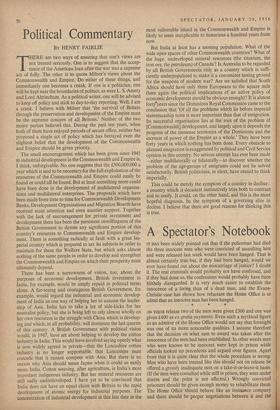Political Commentary
BY HENRY FAIRLIE THERE are two ways of ensuring that one's views are not treated seriously. One is to suggest that the accep- tance of the American loan after the war was a supreme act of folly. The other is to quote Milner's views about the Commonwealth and Empire. Do either of these things, and immediately one becomes a crank. If one is a politician, one will be kept near the boundaries of politics, as were L. S..Amery and Lord Altrincham. As a political writer, one will be advised to keep off policy and stick to day-to-day reporting. Well, I am a crank. I believe with Milner that 'the survival of Britain through the preservation and development of the Empire must be the supreme concern of all Britons.' Neither of the two major parties believeA this. During the past ten years, when both of them have enjoyed periods of secure office, neither has proposed a single act of policy which has betrayed even the slightest belief that the development of the Commonwealth and Empire should be given priority.
The small encouragement which has been given since 1945 to industrial development in the Commonwealth and Empire is, I think, unforgivable. No one suggests that the £500,000,000 a year which is said to be necessary for the full exploitation of the resources of the Commonwealth and Empire could easily be found or could all be found. But at least something more could have been, done in the development of multilateral organisa- tions and multilateral enterprises. The proposals which have been made from time to time for Commonwealth Development Banks, Development Organisations and Migration Boards have received scant attention and even scantier support. Together with the lack of encouragement for private investment and development there has been the persistent unwillingness of the British Government to devote any significant portion of this country's resources to Commonwealth and Empire develop- ment. There is something radically at fault with a great Im- perial country which is prepared to tax its subjects in order to maintain for them the Welfare State, but which asks almost nothing of the same people in order to develop and strengthen the Commonwealth and Empire on which their prosperity must ultimately depend.
There has been a narrowness of vision, too, about the purposes of economic development. British investment in India, for example, would be amply repaid in political terms alone. A far-seeing and courageous British Government, for example, would regard the industrial and economic develop. ment of India as one way of helping her to assume the leader. ship of Asia. India has to take a lot of side-kicks for her neutralist policy, but she is being left to rely almost wholly on her own resources in the struggle with China which is develop. ing and which, in all probability, will dominate the last quarter of this century. A British Government with political vision would, in 1947, have set about helping to develop the cotton industry in India. This would have involved saying openly what is now widely agreed in private—that the Lancashire cotton industry is no longer supportable, that Lancashire must concede that it cannot compete with Asia. But there is no reason why Asia should mean Japan when it could so easily mean India. Cotton weaving, after agriculture, is India's most important indigenous industry. But her mineral resources are still sadly underdeveloped. I have yet to be convinced that India does not have an equal claim with Britain to the rapid development of atomic energy for industrial purposes. The concentration of industrial development at this late date in the most vulnerable island in the Commonwealth and Empire is likely to seem inexplicable to historians a hundred years from now.
But India at least has a teeming population. What of the wide open spaces of other Commonwealth countries? What of the huge. undeveloped mineral resources (the titanium, the iron ore, the petroleum) of Canada? Is Australia to be regarded by all British Governments only as a country which is suffi- ciently underpopulated to make it a convenient testing ground for the weapons of modern war? Are we satisfied that South Africa should have only three Europeans to the square mile (here again the political implications of an active policy of economic development should be obvious enough)? It is almost fortfyears since the Dominions Royal Commission came to the conclusion that 'Of all the problems which lie before imperial statesmanship none is more important than that of emigration. Its successful organisation lies at the root of the problem of [Commonwealth] development, and largely upon it depends the progress of the immense territories of the Dominions and the increase of power of the Empire as a whole.' They have been forty years in which nothing has been done. Every obstacle to planned emigration is exaggerated by political and Civil Service opinion in this country. No serious attempt has ever been made —either multilaterally or bilaterally—to discover whether the problem of the age-groups of emigrants could not be solved satisfactorily. British politicians, in short, have ceased to think imperially.
This could be merely the symptom of a country in decline : a country which is decadent instinctively tries both to contract and to ossify. It could, on the other hand, and this is the more hopeful diagnosis, be the symptom of a governing elite in decline. I believe that there are good reasons for thinking this is true.


































 Previous page
Previous page